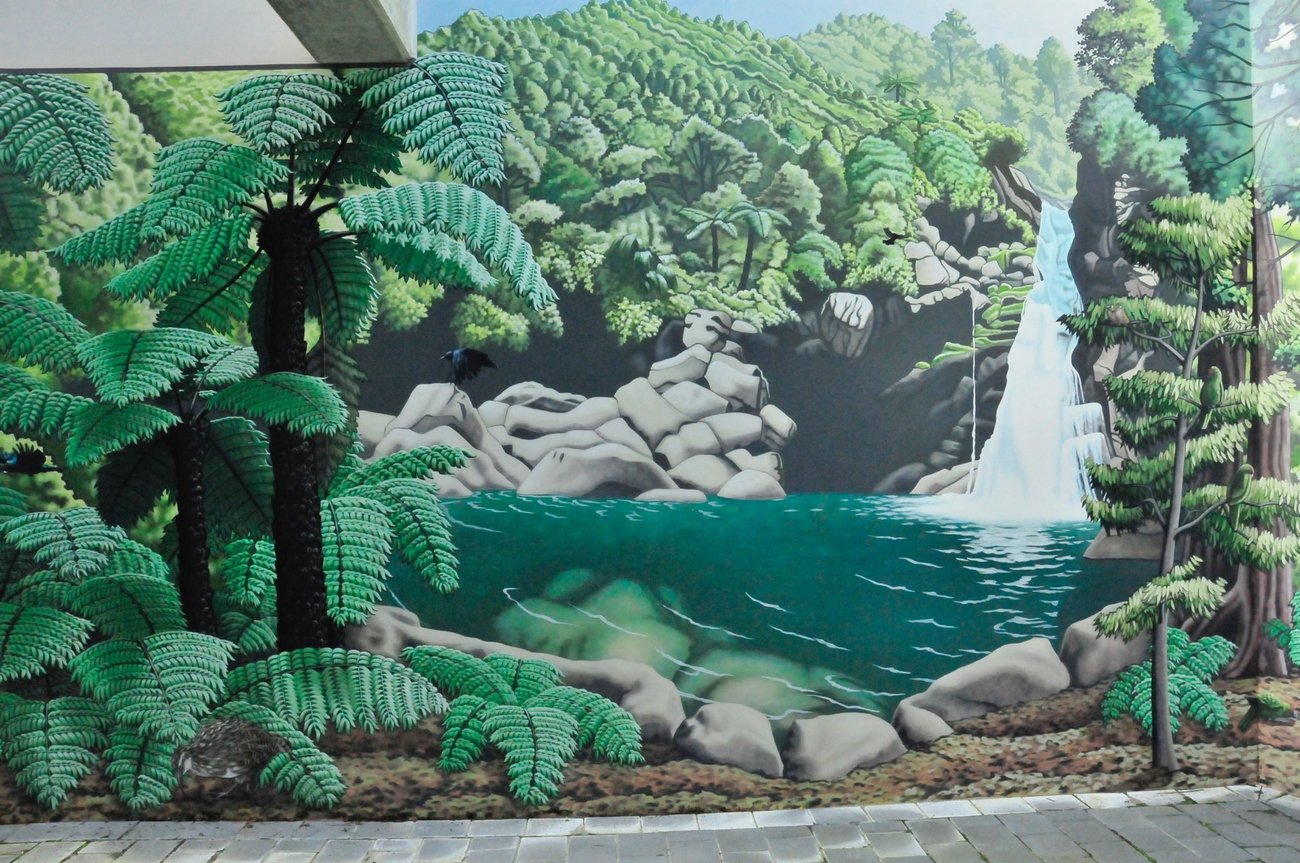
Top image: Ellen Coup.
The growing trend to beautify otherwise ugly urban spaces can span from the towering giant tree-house mural covering the side of a high rise in Bydgoszcz, Poland, to painted piano keys flowing down a hidden stairway in Valparaíso, Chile.
A bit closer to home, the Lonely Planet book Street Art from 2017 listed Christchurch among the top cities in the world to see street art, alongside Amsterdam, New York, London and Rome.
The public art adorning the streets of Christchurch hit the news in December last year during its Street Prints Otautahi festival. Its collection of street art continues to grow, with local and international artists leaving their mark.

Sabine Ford.
“Street art is a really decorative, beautiful art form and it encompasses anything and everything,” says Resene marketing manager Karen Warman.
“Quite a few regions now like Hamilton, Dunedin and Christchurch have mural or street art festivals each year that take over more and more blank walls, so eventually they will end up with maybe six to ten murals a year, and then over a period of five years they’ll end up with a collection of 50.”
We explore some of the country’s outstanding public art, looking at the creations from six talented artists using Resene paints in their mural work.

Jonathan Grange.
Ellen Coup
A life-long painter, Ellen Coup went from making paintings as large as possible to painting murals in 2000, from public projects to private artworks, and uses Resene products in all her work. Her ‘Wellington Cable Car Mural’ painted in 2016 is one of her biggest and most detailed works so far, covering 169 square metres of retaining wall beside cable car tracks in Wellington.
“Extensive research led to a design that generated a visual time-line from 1902 to 2016, using the various iterations of the cable car, the panorama of Wellington, the dress of the passengers and a ‘black and white colour fade’, to do the transition,” explains Coup.
Her ‘Bowen Hospital’ from 2017 covers a wall at Bowen Hospital in Wellington. “This is part of a larger work,” Coup says, adding the intention was to have a calming, flora and fauna bush scene on a side of the building. “Using reference images that included a Golden Bay waterfall and an Akatarawa forest, I created some ‘space’ that made sense in the light conditions of the space.”

Ellen Coup.
Dan Mills
Wellington muralist Dan Mills began painting murals in his first year of Art school in 1995. His style combines meticulous research and design with a local relevance and educational aspect. Recently, he completed ‘The Leviathans’ in Castlecliff, Whanganui.
“The piece draws on my, and the community’s, love of this West Coast,” says Mills. “The whales and albatross are an abstract reference to ambitious and inspiring ideas in literature that seem to sit well in this neighbourhood. The white whales are obvious. There’s also a bit in The Luminaries that compares an albatross to a ship. That image, and the concept of powerful natural forces pulling and steering an evolving community are the themes that brought this mural to life.”
The mural in the Waipu Cove campground is part of a series of murals. “The featured section details Waipu’s Scottish heritage and the incredible migration from Scotland. Imagery includes local and historical identities, [such as Robert Louis] Stevenson.”

Dan Mills.
Marilyn Andrews
Marilyn Andrews has been painting murals for more than two decades. She says the range of colours lets her create “a dynamic or subtle composition as needed, plus I enjoy mixing my own colours from the testpots. It gives huge versatility.”
Her mural commissioned by Nelson Central School was inspired by the history of the school, and incorporated elements of cultural diversity. “I worked together with the carver from the local marae who carved the end and centre panels for the mural. There was controversy at the time over my use of colour on the carvings as it was not traditional. In the end most were happy with my choice of colours, and the way it integrated with the mural itself.”

Marilyn Andrews.
Jonathan Grange
Airbrush artist Jonathan Grange is self-taught, and his murals can be found around the Rodney District and on the North Shore of Auckland. His work is a reflection of the environment surrounding the art, such as native birds or coastal beach scenes.
One of his murals adorns the walls of the kiddie pool at the Glenfield Leisure Centre. It depicts an array of sea life, from a mother sperm whale and calf to penguins and baby turtles. “On one wall is a mini mural of waves breaking and a sunset,” says Grange. “This represents the sea as a harsh environment, and ultimately learning to swim with progress will lead to open water and respect. I love using Resene colours as they are so vibrant and versatile to use through an airbrush. Before I paint a mural, I get inspiration from the area it’s in, then research and fine-tune ideas until I’m happy with the design.”

Jonathan Grange.

Jonathan Grange.

Jonathan Grange.
Sabine and Doug Ford
Through 42 traffic boxes and more than 19 murals, artists Sabine and Doug Ford have been converting Auckland suburbs using Resene colours.
Their work has encouraged other business associations and the Waitakere City Council to have more artists working in their areas to beautify their streets.

Sabine Ford.
Karen Beckett
Environmental artist Karen Beckett has painted murals onto shipping containers, bus exteriors, and buildings.
Creating murals to illustrate life experiences, working and recreational environments, she often works with Resene Lumbersider satin acrylic, and encourages people to get a hands-on appreciation of the art work.





